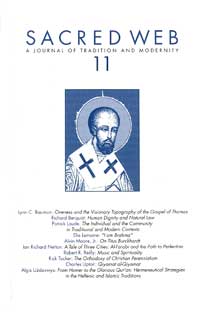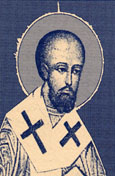Sacred Web 11
Editorial: Umberto Eco, Fascism and Tradition
by M. Ali Lakhani
Umberto Eco has charged tradition with influencing fascism. This editorial surveys the evidence and demonstrates how this view is based on fundamental misreadings of traditional doctrine. Read more ...
“I am Brahma”
by “Elie Lemoine”
This is the first publication in English of a chapter from Doctrine de la Non-Dualite et Christianisme, by an anonymous Cistercian Trappist monk influenced by the traditionalist writings of Rene Guenon. The article examines and analyses the Vedantic doctrine of Supreme Identity proposed by the Hindu formula Aham Brahmasmi, and is interspersed with spiritual insights from a traditionalist Christian perspective.
One for All, All for One: The Individual and the Community
in Traditional and Modern Contexts
by Patrick Laude
Tensions within the individual and the community have metaphysical roots. Tracing these roots, the author discusses the implications for modern societies in which these tensions manifest as particularization and globalization, as solidification and dissolution, and also examines how these tensions are resolved in traditional societies.
Oneness and the Visionary Topography of the Gospel of Thomas
by Lynn C. Bauman
Arguably the most interesting of the Nag Hammadi manuscripts, the text of the Gospel of Thomas predates the canonical gospels and is thus our access to the record of Jesus’ thought in its most “original” form, as a continuation of a perennial sophiology rooted in prior traditions. This essay draws from the text two themes: the unitive quest underlying duality, and the visionary topography of that quest as a “hermeneutic of progression” towards transcendence.
The Orthodoxy of Christian Perennialism
by Rick Tucker
In Sacred Web 10, Steven D. Boyer challenged the views of Christian perennialists, arguing that the traditionalist thesis of the transcendent unity of religions was incompatible with orthodox Christianity. This article by a Christian perennialist is a response to Boyer and a rebuttal of his arguments, demonstrating how Christian scriptures and commentaries support the perennialist understanding of the orthodoxy of Christ as Logos in a cosmic sense, an understanding that lies at the heart of its pluralistic ecumenism.
From Homer to the Glorious Qur'an: Hermeneutical Strategies
in the Hellenic and Islamic Traditions
by Algis Uzdavinys
Drawing from diverse traditions, in particular the Hellenic and Islamic traditions, the author compares and contrasts how meanings are derived from texts and how hermeneutics is ultimately a spiritual journey in which mythological patters correspond to archetypes that relate to inner dimensions of ourselves, a self-sufficient ladder to divine perfection.
A Tale of Three Cities: Al-Farabi and the Path to Perfection
by Ian Richard Netton
To what extent did the great Muslim philosopher, al-Farabi, draw from Platonic, Aristotelian and Neoplatonic thought? This article examines these influences on his writings, focusing on his magnum opus, The Virtuous City, and comparing this work with two other works in the “city” genre, The Republic by Plato, and The City of God by Augustine.
Human Dignity and Natural Law
by Richard Berquist
This essay, presented as a lecture at Thomas Aquinas College in March 2002, examines and argues for the basis of human dignity, and concludes with a reflection upon the materialistic impediments to its recognition as a vital component of natural law.
The Music of the Spheres
by Robert R. Reilly
This essay, presented as a lecture at Thomas Aquinas College in March 2001, discusses how music is related to the harmony of the soul.
Qiyamat al-Qiyamat
by Charles Upton
Metaphysical musings on the meaning of Qiyamat.
Book Review: The Essential Titus Burckhardt: Reflections on Sacred Art, Faiths and Civilizations
Reviewed by Alvin Moore, Jr.
Letters to the Editor
Notes on Contributors




